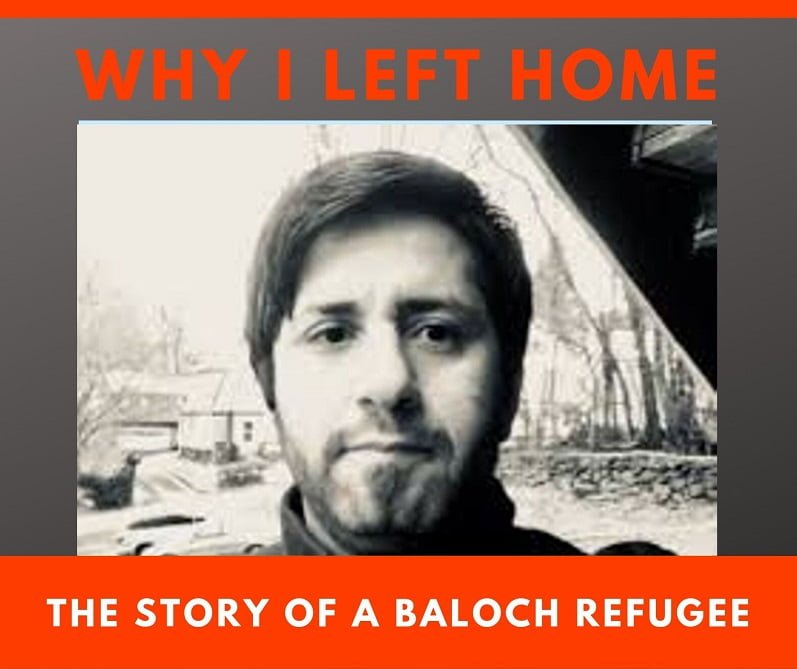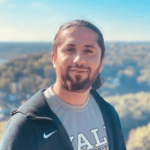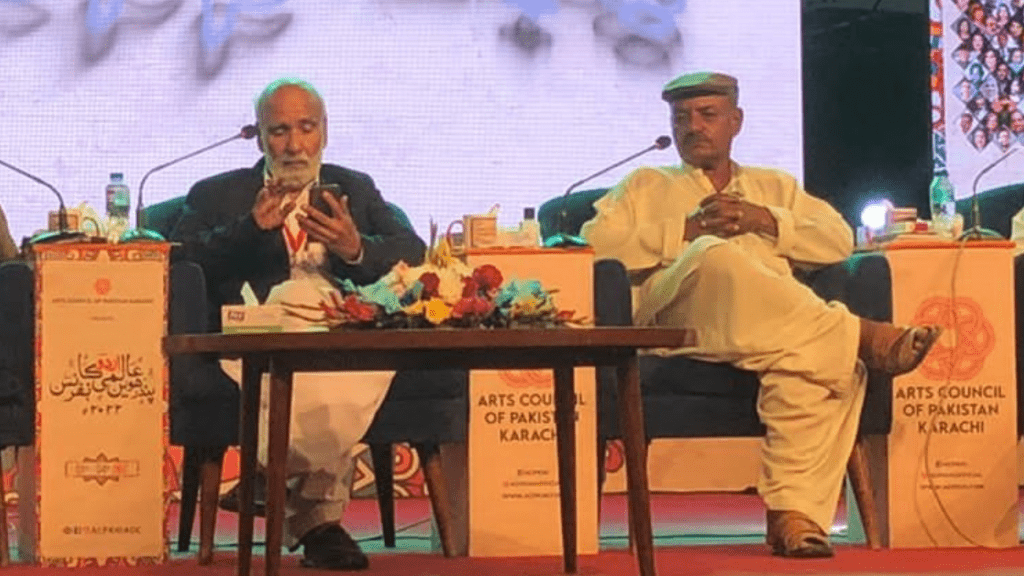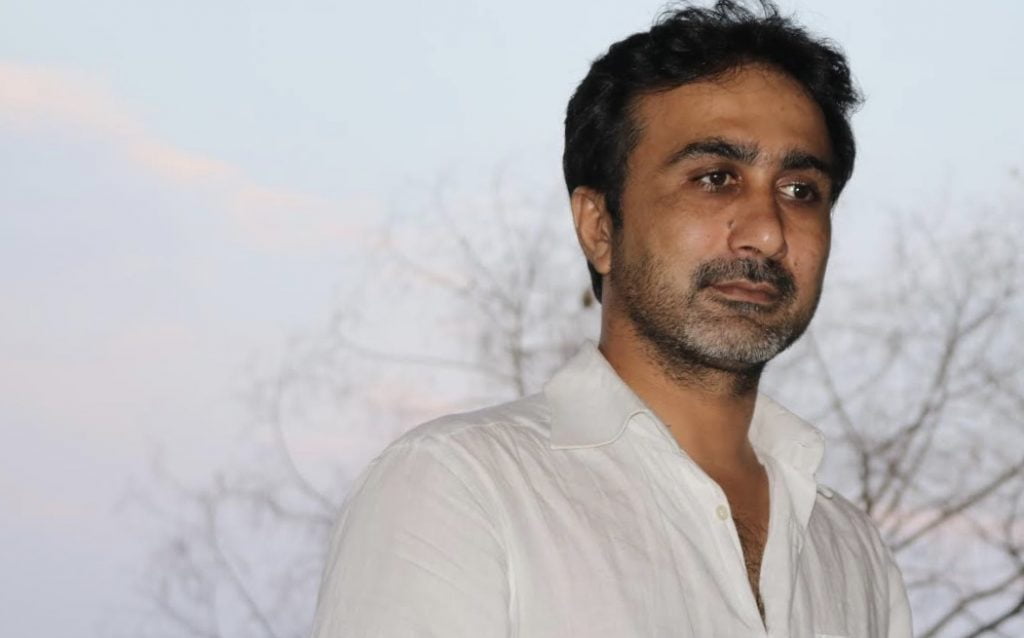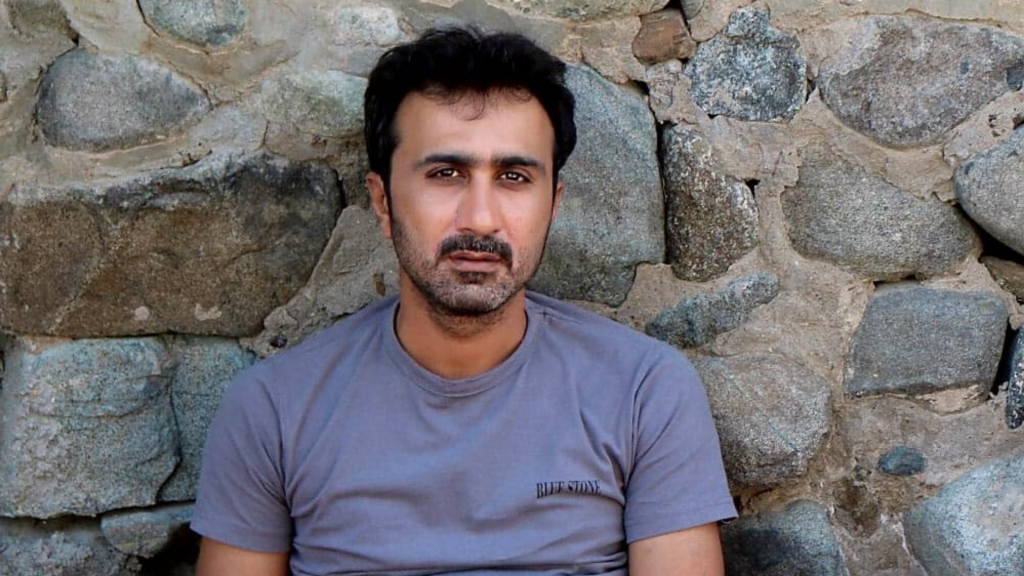I am obsessed with reading novels, short stories, or any literature about people who left their homes, were expelled from their countries or persecuted. A part of keeping informed is I don’t get weary of watching movies and documentaries about the lives of refugees or victims of torture and imprisoned for unjust reasons.
Of course, watching these movies now is different from when I was a kid in the late 90s, enjoying the silver screen with friends and cousins. Now the movies I watch are about real life, and they feel close to my real life.
When I go to bed after watching a movie in any language, I wake in the middle of the night, scared, reliving the scenes as if I am being abducted or tortured, or our village is being burned or evacuated, or I am running away from some army man, always afraid of what lies ahead, just like in the movies. This is painful, but is now a part of my life, part of why I left my home. I cannot run away from the reality of confronting it. Being aware of the trauma and the trials of others has made me realize that I am not the only victim of war, subsequent loneliness and homesickness. Which is why I decided to share my story too.
I was born in a small village called Khairabad, near Kech, in the south of Balochistan. I never imagined in my wildest thoughts that one day I would be sitting alone, lonely, in the corner of a coffee shop writing the story of leaving my home, my family, friends, relatives, and carry along the childhood memories. I now understand how important they are and what they mean to a person.
Not only watching movies was fun, but my childhood was, as most childhoods are, innocent of the country’s political situation. As the only son of my parents, I was privileged to receive an abundant amount of love and affection from my cousins, aunts, uncles, and extended family. Daily life was going to the mud-built structure that served as a school, playing cricket after school with cousins and friends and occasionally herding the sheep to the fields. In the summer during school break, I would join my uncle and grandfather at date-palm farms, where my grandfather would sell the dates to city folks from Karachi who would come to buy Makurani dates at rock-bottom prices that only we offered.
Getting older was exciting, because our world expanded, or so we thought. Together with my cousins, we could not wait to go to Turbat, the nearest city that was 40 miles (64 kilometers) away. The only public transport from our village were Toyota pickups that took over an hour to reach the city on dirt roads. Once there, we would buy Balochi Chawat (traditional footwear) and walk around the streets of Turbat city.
Rahmat-e-Sheeren, Gadi Chok, and Balochistan Music Center were my favorite places in the city. Whenever I would go to Turbat, I would buy one Balochi cassette of music and never missed the Rahmat-e-Shereen sweets and samosas. It was a different world full of more adolescent kind of fun. My mother had promised me that when I graduate from high school that she would send me to Turbat for higher education. So, whenever I went to Turbat and looked at the buildings of Atta Shad Degree College, I told myself that I would be there someday, attending college classes in those buildings.
It wasn’t until I graduated from high school that I came to know that the land where I was born had already seen three political battles between Baloch nationalists and the Pakistani military. All of the conflicts involved much bloodshed, including of course people who were fighting for their land and justice. The people of Balochistan suffered the killing and persecution of numerous political leaders and as many activists, of whom if they weren’t killed took refuge in Afghanistan and the neighboring province of Sindh. Fortunately, Turbat, and the town where I grew up had not been affected by these trials as much as other towns, hence I was able to grow up somewhat innocent and enjoy being a child safe under the watchful eyes of my family.
Kech
My mother was good for her word: In 2006, I gained admission in Atta Shad Degree College and moved to Turbat. There were three dormitories for students on campus known as New, Old, and Complex. I was assigned to room six in the Old building. Four students, who were all from different villages and towns in the Kech district, and I shared the room. I also shared an education with these friends and roommates that wasn’t limited to the classroom.
As I learned my way around campus, I saw much writing and graffiti written in red paint and spray paints. It was written by the Baloch Student Organization (BSO). The various graffiti messages read:
“We didn’t accept the state census in Balochistan.”
“Kalam may tawar kitab may rahsoon. (The Pen is our guide, the Book our Leader!)”
“BSO ke rehnumabo ki griftari ryasati deshatgardi hai. (The arrest of BSO leaders is a form of state terrorism!)”
“Warna raj e bandat ant. (The youths are the future of the nation)”
“Army, get out of Balochistan.”
“We need education, not jail.”
This wasn’t the first time I had heard of the BSO. The first time I heard the name of the organization was in 2003, when I was in school. One of my cousins told me that some BSO walas were visiting our school and arranging a study circle type of event for the students. It was the first and last event of any kind that was conducted for students during all my school years. This organization seemed to care.
Apart from seeing BSO footprints around the campus and my singular knowledge of its existence from my cousin, I felt like a person who was given a new set of eyes, who had just popped out of his old environment into a contemporary world. College life was an entirely new experience for me. Not just the interaction with my roommates, but the daily interaction with several students from different towns and villages gave me a broader perspective on people.
Reading various works of literature that I had never before encountered, gave me a more reflective understanding of life. I made new friends and occasionally attended BSO study groups, where I sat around sipping the bitter and sweet tea at Pyary’s Canteen and smoking cigarettes like a grown-up man. I had crossed the threshold of adulthood by now.
Little did I know what lay beyond that initial step into being “grown-up”. How things would change so fast or how I ended up here sitting at this coffee shop writing, in exile. I am still asking myself these questions.
On August 27, 2006 the military entered the college grounds armed with loaded weapons and the arms of war. Faster than anyone could raise an alarm, almost one hundred students and staff of the college were taken becoming hostages of the military. Knowing this was illegal, just one of the offenses the military was committing, the principle of the school went out to tell the army Major leading the invasion that, without any official notice, he was not allowed to enter the college premises. The military man started shouting. I still remember his exact words: “Who the hell are you dictating what I can and cannot do? And what my authorities are!!!”
Naturally, the petrified students who were not taken by the military, were left to stand by, unable to believe what was happening. Remember, we were from an area that had not been directly affected by the political upheaval, this was not comprehensible to us.
The teachers themselves told us that the military had never forced themselves on college property before. This was an escalation of a situation none of us were well-informed of at the time. Unbeknownst to us at the college, the day before on August 26, a Baloch politician named Nawab Akbar Bugti, was assassinated in a military operation in Dera Bugti, his home town. Reacting to the assassination, student activists and politicians were out protesting against the military. In response, the military then put a curfew on the city of Turbat and other parts of Balochistan. The military had come to our school, as they had to colleges and universities across Balochistan to cordon off the areas and prevent students from going out and protesting against the military. When the security forces left the campus, I breathed a sigh of relief – as I’m sure everyone else did – packed my bags and left the city.
The invasion of the military was too much for me. But there was nothing for me to do at home and no space to smoke my cigarettes. I got bored. Even though I didn’t want to return, it was for me the only place to go at the time. So, after a week I returned to Turbat and college.
Returning to the college, I picked up where I left off from and started the same routine. However, it was not the same anymore. Turbat city had changed now, and it seemed to have spread throughout Balochistan. There was a feeling of trepidation. Students were caught up in politics, demonstrating and protesting against the state for the exploitation of Balochistan’s resources and the mistreatment of the people. The assassination and military incursion had awakened everyone to become involved, to be heard.
Of course, the military didn’t stand this. This was what they had tried to prevent in the first place, when they first showed up at the colleges and universities. On the other hand, some Baloch nationalists were holding political gatherings and raising the issue that Pakistan has been exploiting not only the resources, but the education and culture of Balochistan for the past six decades. Regardless of any negotiations that took place, the military seized and threw students in jail all over Balochistan. In an injustice as old as time, these activists were being put in jail for believing in and voicing the rights of Baloch to have a say in the governance of their own land.
The BSO
Although Aristotle wrote that the man is by nature a social animal, it is not entirely the reason I took the steps that I did leading to further escalate towards my exile. An intellectual capacity for seeing and understanding moral imperatives and wrongs was awakened in me. Being part of the Baloch students community, I started attending political gatherings at the college. There were two tiers of academic study at the college: one was regular classes with professors and the second was the Study Circle, which was arranged by students once or twice a week to talk and get insight on international politics, the political situation surrounding us in Balochistan, and literature and writings on democracy and liberalism. To add to our learning in the study circles, we invited Baloch intellectuals from different specialties to educate us.
From this training, I learned that as a people, we Baloch have a distinct culture and history which is different from the other nations in Pakistan, especially from the ruling majority class. I came to know a different version of history, one which was always hidden by the state from us. This different version of Baloch history is a history of subjugation and manipulation of our people by the state. This most recent version of Baloch history that I learned made me more critical of the everyday injustices that were occurring – had been there for a long time – in Balochistan.
Despite the very important learning that was taking place, I left Atta Shad Degree College after a year and a half. One day I just took my clothes, folded them in a dirty bag, and left the dorm with teary eyes. But I left my books in my room, just for the self-satisfaction that I would come back some day. There were two reasons I decided to leave. First was financial. My father had passed away when I was in 8th grade at school, and the amount of money he left behind was not enough to continue my higher education. The second reason was the city was getting more fraught with fear. The student dormitories were under watch by the Pakistani intelligence agencies. There was a big military base and secret service building near the college. Every night unknown people freely roamed the college grounds and went through the dormitories. There were suspicious cars with tinted mirrors that followed students when they arrived and left the main gate of the school. I was disillusioned, I knew I couldn’t stay.
Once home, I tried to ask relatives in the gulf countries to get me a labourer’s visa to get me out of there. But this wasn’t the path my mother was willing to let me go down. She was convinced that I must finish college. When I insisted that I could not go back to college in Turbat, she refused to give up on me following a higher education. She suggested going to school elsewhere. “Why don’t you go to Karachi? Karachi is a safe city. I will arrange some money for you.” And that’s just what she did. After staying at home for four months, I went to Karachi in August 2007 because of my mother’s persistence.
Karachi
It was a challenge to go back to school, and I faced a dilemma even though I had reached Karachi: Should I continue in school or should I return home and try to find a visa? This time I asked some relatives in Oman, Qatar and UAE, but did not receive any response. Which led to my decision to stay in Karachi until I finished my master’s degree.
Four other students, all from my village, and I rented a two-bedroom tiny apartment in Gulistan- e-Johar. The others had arrived before me and knew the lay of the land. Just to help me along, one of my roommates wrote on a piece of paper the names of three buses and where they would take me: ‘11-A will take you to the Liaquat Library, 4X will take you to the tuition center, and Lucky Star brings you home.’ That piece of paper and it’s directions were the start of a new life in Karachi.
In Liaquat Library, I met with several Baloch students who had traveled a hundred miles to come to Karachi to fulfill their desire for knowledge. Some of whom I met at the library were students enrolled at colleges, some from different universities. We were all there for the same reason: we had all learned a thing or two from the study circles of BSO back in our hometowns or and brought that knowledge to Karachi with us.
During this time in Karachi, my friends and I were treated as if we were illiterate, ignorant people. We heard many times, both in our classes and in public places that we Baloch lived in the mountains, were not civilized people, violent, uneducated, did not know how to speak proper Urdu, and just don’t wear decent clothes. We were frightened to go into non-Baloch dominant areas.
Despite being citizens of Pakistan, we were considered and treated as third-class citizens. My perspective and understanding of myself and fellow Baloch’s standing changed when I faced these biases. Luckily, during this time I was learning other things too which was strengthening my resolve, and the easy access to books, libraries, and the internet was aiding the person I was becoming. I had always wanted to be a social worker and accomplished this goal, first earning an undergraduate degree in 2009 in Sociology and then a Master’s Degree in Social Work in 2013.
Subsequent to completing my education, I worked for a couple of non-governmental organizations helping people as a social worker. However, despite my developing character and working in my chosen field and corporeal self being in Karachi, my thoughts were in Balochistan, my homeland.
My thoughts were soon to be cemented forever with Balochistan as it became harder to visit. In 2009, the Pakistani military started a new tool, a program called “Kill and Dump” to quell any kind of resistance, imagined or real, to their authority. This was intended to stop the Baloch political movement which was gaining more and more popular support in every corner of Balochistan. It was much stronger than the three previous political movements and especially since the Baloch youth were participating in it from the beginning.
The army first abducted those Baloch leaders and activists who condemned state absolutism in their public gatherings and demanded justice from the West, calling out to human rights organizations to intervene in Balochistan to stop state forces from exploiting Baloch resources. The military’s ruthlessness didn’t end there. Within a couple of years, the state deployed a hundred thousand security forces in different towns in Balochistan, built more security checkpoints on highways, where they checked every passenger’s identification card. It was also announced in print and electronic media that the state will punish the supporters and facilitators of the Baloch movement.
Mostly student activists, guilty only of trying to have their voices heard, were abducted from security check-posts. Every two to three days, they would “disappear” people from Bozi checkpoint, Gwadar Zero Point, Uthal checkpoint, and Khuzar checkpoint, and their decomposing bodies were dumped in Murgap, Turbat, Uthal, Quetta, Khuzdar and other parts of Balochistan.
My journey of social work and helping others didn’t go far because of the “Kill and Dump” operations. I was afraid I would be abducted and killed like many other students and activists. From 2009 to 2015, during my time in Karachi, we lost several BSO’s activists and some close friends. Zakir Majeed, a M.A English literature student and Senior Vice Chairman of BSO, was forcibly disappeared in Mastung in June 2009, and is still missing; no one knows about him. Qambar Chakar, 24, a student of Balochistan University of Information Technology Engineering and Management Science (BUITEMS), was abducted with his cousin in November 2010 from his home. Later his cousin Irshad Baloch was released, but Qambar Chakar’s decomposed body was found dumped in Murgaap, Turbat along with another missing student Ilyas Nazar, only 22, in January of 2011. Raza Jahangir, a good friend and Secretary General of the BSO, was killed in August 2013 with another activist Imdad Baloch in a military operation in Turbat. BSO’s Chairman Zahid Baloch was abducted in March, 2014 in Quetta, and he is still missing along with others.
With tensions and apprehensions escalating, traveling became more difficult. I had to cross ten to eleven security check posts, show my identification card to the army-guard whenever I went home from Karachi. I was asked numerous prying questions at the security checkpoints, and I had the feeling that they were just trying to pinpoint my movements and get information that was innocent enough, but that would be used against me for some unknown reason. It was getting more and more dangerous.
The last time I went home to Khairabad was in June 2014. After that, I stopped going back to the place where I grew up, and the place where my father, grandfather, grandmother, and uncle are buried. The place I call my homeland. My home.
In August 2015, I landed in the United States with the hope of finding a safe shelter to live peacefully for the rest of my life.
The author tweets at @noroz_hayat
Noroz Hayat is a writer and a human rights activist based in the United States. He writes in Balochi and English on human rights situation of Balochistan. He is affiliated with Human Rights Council of Balochistan.
